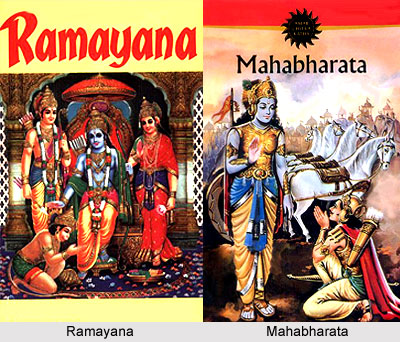Introduction
The study of ancient Indian history relies on various sources, including archaeological findings, epigraphs, and literary works. In this article, we will explore the significance of Literary Sources of Ancient Indian History. Literary sources provide invaluable insights into the social, cultural, religious, and political aspects of ancient Indian civilization.
Types of Literary Sources
- Vedic LiteratureThe Rigveda, Yajurveda, Samaveda, and Atharvaveda
- Insights into Early Vedic Society, rituals, and religious beliefs
- Buddhist and Jain TextsTripitaka (Buddhist canon) and Jain Agamas
- Teachings, doctrines, and philosophies of Buddhism and Jainism
- Epics and PuranasMahabharata and Ramayana
- Mythological narratives, moral codes, and legends
- Historical ChroniclesRajatarangini by Kalhana
- Detailed accounts of historical events and rulers
Analysis of Literary Sources of Ancient Indian History

Literary sources provide valuable historical information, but evaluating their reliability, authenticity, and biases is essential. While they offer glimpses into the past, we must consider the socio-political context in which they were composed.
Significance of Literary Sources
- Understanding Ancient Indian Society and CultureDescriptions of societal structures, caste system, and family life
- Insights into art, architecture, and daily life
- Insights into Religious and Philosophical BeliefsExplorations of Hinduism, Buddhism, Jainism, and other ancient Indian religions
- Concepts of dharma, karma, moksha, and reincarnation
- Political and Historical EventsAccounts of dynasties, kingdoms, and battles
- Details of administration, diplomacy, and warfare
Comparison with Archaeological Evidence

Literary sources complement archaeological findings, providing a holistic understanding of ancient Indian history. When literary and archaeological evidence converges, they validate historical facts and narratives.
Notable Literary Works
- RigvedaOldest Vedic text containing hymns and prayers
- Insights into religious rituals and poetic traditions
- Mahabharata epic poem depicting the Kurukshetra War
- Moral dilemmas, philosophical discourses, and iconic characters
- RamayanaThe epic narrative of Prince Rama’s journey
- Ethical values, heroism, and devotion
Interpretation and Translation Challenges
The interpretation and translation of ancient Indian literary sources pose significant challenges due to language barriers and cultural nuances. Scholars strive to bridge these gaps to extract accurate meanings and context from the original texts.
Preservation and Digitization Efforts
To safeguard literary sources, extensive efforts are being made to preserve ancient manuscripts through initiatives such as manuscript conservation projects. Additionally, digital repositories are being created to ensure complete access and long-term preservation of these invaluable texts.
Influence on Modern Indian Literature
The literary sources of ancient Indian history have left an indelible mark on modern Indian literature. Many contemporary works draw inspiration from ancient texts, incorporating themes, characters, and philosophies to preserve and celebrate India’s rich literary and cultural heritage.
Conclusion
Literary sources play a pivotal role in unravelling the mysteries of ancient Indian history. From Vedic texts to epics, they provide windows into the past, offering valuable insights into society, religion, politics, and more. While acknowledging the limitations and biases inherent in these sources, their combined study with archaeological evidence enhances our understanding of India’s ancient civilization.
FAQs (Frequently Asked Questions)
- Are literary sources the only means to study ancient Indian history? No, literary sources are one of essential sources alongside archaeological findings, epigraphs, and other historical records. The combination of these sources provides a comprehensive understanding of ancient Indian history.
- How reliable are literary sources in depicting historical events? Literary sources should be approached with a critical mindset. While they offer valuable insights, they can be influenced by the authors’ biases or the socio-political context in which they were written. Corroborating literary evidence with other sources helps establish a more accurate historical narrative.
- What challenges arise in interpreting ancient Indian literary texts? Language barriers and cultural nuances present challenges in interpreting ancient Indian literary texts. The texts are often written in archaic forms of Sanskrit or regional languages, requiring expertise in deciphering and understanding their context.
- How have digital repositories contributed to the preservation of literary sources? Digital repositories have played a significant role in preserving and disseminating ancient Indian literary sources. By digitizing manuscripts, these repositories ensure complete access, facilitate scholarly research, and protect the texts from physical deterioration.
- How have ancient Indian literary works influenced contemporary literature? Ancient Indian literary works have had a profound impact on modern Indian literature. Many authors draw inspiration from these texts, reinterpreting mythological narratives, exploring philosophical concepts, and incorporating cultural themes into their writings.
In conclusion, the literary sources of ancient Indian history serve as invaluable windows into the past. From Vedic texts to epics and chronicles, these sources offer insights into ancient Indian society, culture, religion, and politics. While analyzing these sources, it is crucial to consider their limitations and biases and to corroborate their accounts with other historical evidence. The preservation and digitization of literary texts ensure their accessibility for future generations, while their influence on modern Indian literature keeps the rich heritage alive.
What Were the Features of Education System in Ancient India
Future Prospects of Tourism in India


[…] Literary Sources of Ancient Indian History […]